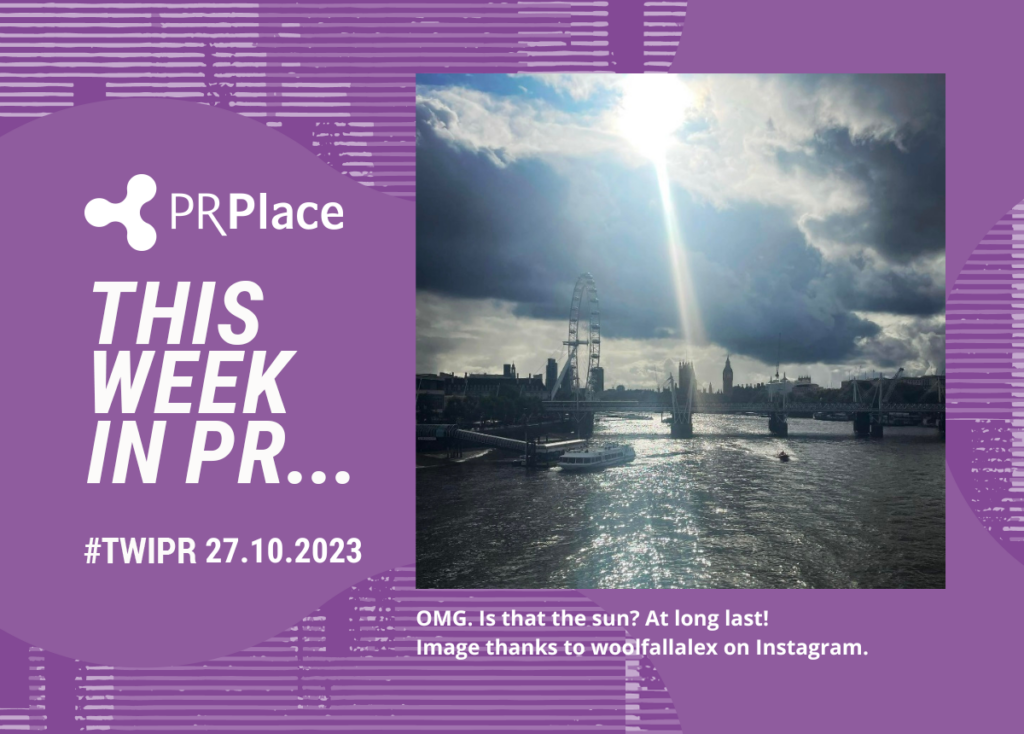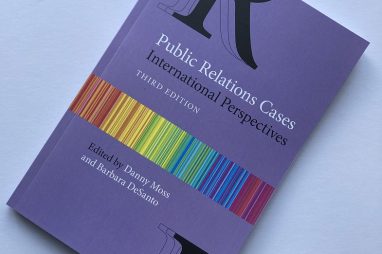This week in PR (27 October)

About the author
Richard Bailey Hon FCIPR is editor of PR Academy's PR Place Insights. He teaches and assesses undergraduate, postgraduate and professional students.

It happened this week
- Grayling CEO Sarah Scholefield is to lead Grayling’s parent company, Accordience Group (formerly Huntsworth Communications), PRovoke Media reports. She has also been appointed the PRCA’s first honorary president.
- Man v machine: Sir Martin Sorrell saw an opportunity to use digital technology to disrupt marketing services. It appears technology and AI may have disrupted his attempt according to this piece of news analysis in The Guardian.
- Beth Colmer versus Anthony Hughes: #ConsumerCorner: Halloween – love at first bite… or more like resting witch face? (24 October)
‘I LOVE Halloween. Always have. The theatrics, the parties and especially, the costumes.’
‘What is the point of Halloween? It seems to exist for its own sake, or so that retailers can cash-in selling cheap tat which all goes straight in the bin the next day.’
Profession and ethics
- Louise Thompson: Are we lazy leaders? The scourge of mediocrity in the Communications profession (24 October)
‘This is how I define a lazy leader in comms. It’s someone who says “yes” to every request, without evaluating it and prioritising it, in line with strategic goals and success factors. Who still equates press releases and “busy work” with success, measuring comms value in “outputs” vs “outcomes”.’ - Heather Yaxley: What has modern corporate communications become? (23 October)
‘Orchestrating the components of corporate communication requires an integrated approach. An interdisciplinary understanding of an entire body (corpus) and framework of practices, however, they may be arranged and activated.’
Purpose, climate and ESG
SUSTAINABILITY COMMUNICATION DIPLOMA
- Mark Goyder: What is corporate responsibility and how can I identify it? (23 October)
‘It wasn’t easy to design the survey. There are so many elements to a responsible company and so many different expectations of companies we may have. It isn’t enough for companies to claim things. The proof of the pudding is in the eating’ - Martin Farrar-Smith: Brands should be delivering progress, not purpose. (21 October)
‘The ‘Progress’ a brand can deliver is a much more appealing metric [than Purpose]. It’s tangible, measurable, less ambiguous and more unifying internally and on a consumer-facing level.
Consulting, skills and careers
- Ben Smith with Eileen Boydell: Are there any truly global PR campaigns anymore? The PR Network’s managing director, Eileen Boydell, on the PRmoment Podcast (26 October)
‘We’ve a presence in sixty markets globally, driven by client demand. If a client comes to us on an international basis, we tend to have more than one option in most markets.’ - Keshi Bouri: Agency life: Late nights should be the exception not the rule (24 October)
‘I believe as an industry we must embrace a better approach to deadlines, more efficient working practices and respecting employees’ rights to a balance between work and life.’ - Brendon Craigie: Remote working – why a lack of intent has left bosses scrambling (23 October)
‘The challenge for so many businesses which are now wavering on their commitment to remote work is that they became accidentally remote. This shift was thrust upon them during the pandemic and they now find themselves in a situation where they don’t know whether to stick or twist.’
Gender, diversity, health and wellbeing
- Jill Spurr: Dear person behind me… (26 October)
‘Recently, I’ve found myself reflecting on my mental health, and for once, it’s been really pleasurable. I finally feel like I am a whole person, and my brain isn’t constantly on high alert in a scary world, or telling me that I’m not as good as everyone else.’
Public and third sectors
- Matt Nicholls: The word on the local government street is… (26 October)
‘Another unforeseen consequence of hybrid working is there is less contact between teams and elected members. This matters when communicating in a political environment. Many colleagues highlighted concerns about political awareness skills, which in pre-covid days may have been honed through those moments when a councillor passed your desk or you chatted with them at the water cooler.’
Politics, public affairs and public sphere
- Joe Cooper: A not so happy anniversary? Assessing Rishi Sunak’s first year as Prime Minister (26 October)
‘Sunak will also take some heart from the fact that, though his party remains far behind in the polls, Keir Starmer’s personal popularity remains some way short of Tony Blair’s in 1997.’ - Louis O’Halloran: Charting the Path Forward: Overcoming the UK’s Infrastructure Impasse (25 October)
‘There are genuine political solutions. For example, changing fiscal rules so that infrastructure investment is treated differently from day-to-day spending, changing the formulas in the much-criticised Green Book, or even taking the responsibility altogether away from the Treasury and giving it to Parliament and local authorities. - James Dowling: Huntsman or Fox? (24 October)
‘Hunt has Truss to thank for his current job – but also to blame for his predicament. The consequence of her reckless approach to the public finances was a meltdown in Tory poll ratings that is likely to doom them at the next election.’ - David Scane: Government’s Renters (Reform) Bill progresses despite criticism from all sides (24 October)
‘The proposed legislation aims to overhaul the rental housing sector, but its enforcement may face delays.’
Research, data, measurement and evaluation
- Paul Sutton with Andrew Bruce Smith: Need to know: Google Analytics 4 for communications pros [podcast] (25 October)
‘Whereas its predecessor Universal Analytics was pretty intuitive, GA4 has very obviously been built by data engineers with no grasp on real world use.’ - Matt Denby: Measuring media relations: 5 ways to integrate more data into PR (no date)
‘When people want to find answers about something their first point of contact is to search the internet. So, it’s a useful and insightful tool to be able to see the volume of people searching for your brand.’
Crisis, risk and reputation
- Amanda Coleman: Severe, red, critical – what alert is it? (21 October)
‘There are quite a few warnings that we might face: the threat level which has its five levels from low to critical, flood warnings which are a flood alert, flood warning and severe flood warning, and then the red and amber of the severe weather alerts. It can become quite confusing.’
Internal communication
- Advita Patel: How to talk about the Israel-Palestine crisis in your organisation (25 October)
‘This isn’t something I can pretend isn’t happening, and as communication professionals, we have an obligation to ensure we’re giving the best professional support possible so our colleagues and leaders receive open, respectful communication.’
Media, digital and technology
- Matthew Ford: The SEC Newgate AI Weekly (26 October)
‘AI news in the next week is likely to be dominated by the UK’s AI Safety Summit, which will be held on the 1st and 2nd of November in Bletchley Park.’ - Nathalie Dixon-Young: In Conversation with Oliver Gill, The Sunday Times – Five key takeaways (25 October)
‘The most compelling stories are those you would tell your friends when you walk into a bar. That’s how journalists are trained. Comms professionals could do well to borrow from that rule of thumb. These stories offer something new or a fresh perspective. Something that makes a journalist think “I hadn’t thought of that” is likely to have the same effect on their readership.’
- Michael White: Experts at Chatham House discuss AI risks and regulation ahead of AI Safety Summit (25 October)
‘Next week the UK Government is making a bold play to join the regulatory and geopolitical discussions related to AI technologies. The AI Safety Summit at the historic Bletchley Park will recognize the transformative impact that AI could have on our economy, society, and international affairs.’
Academic and education


